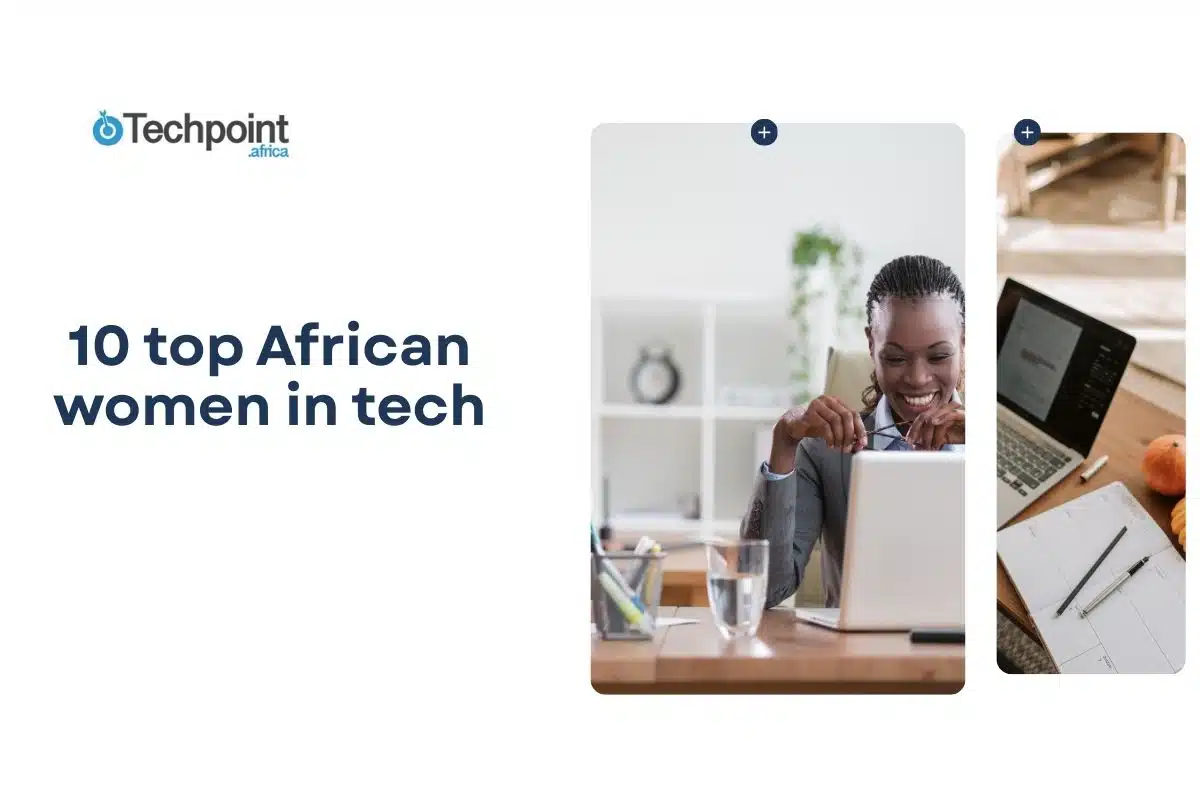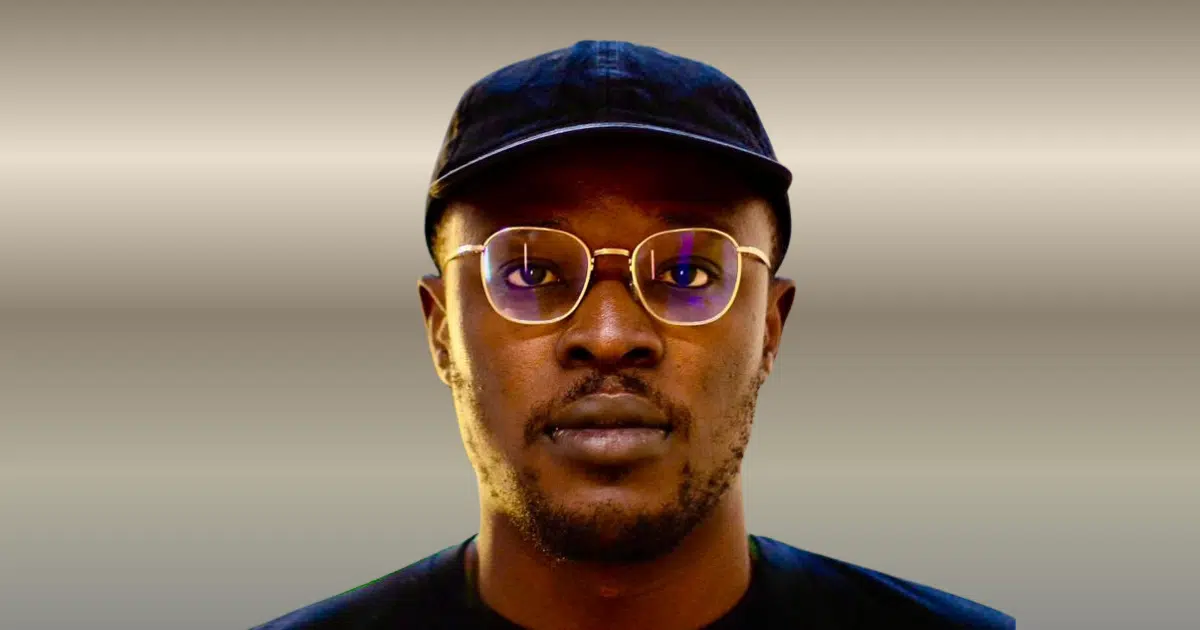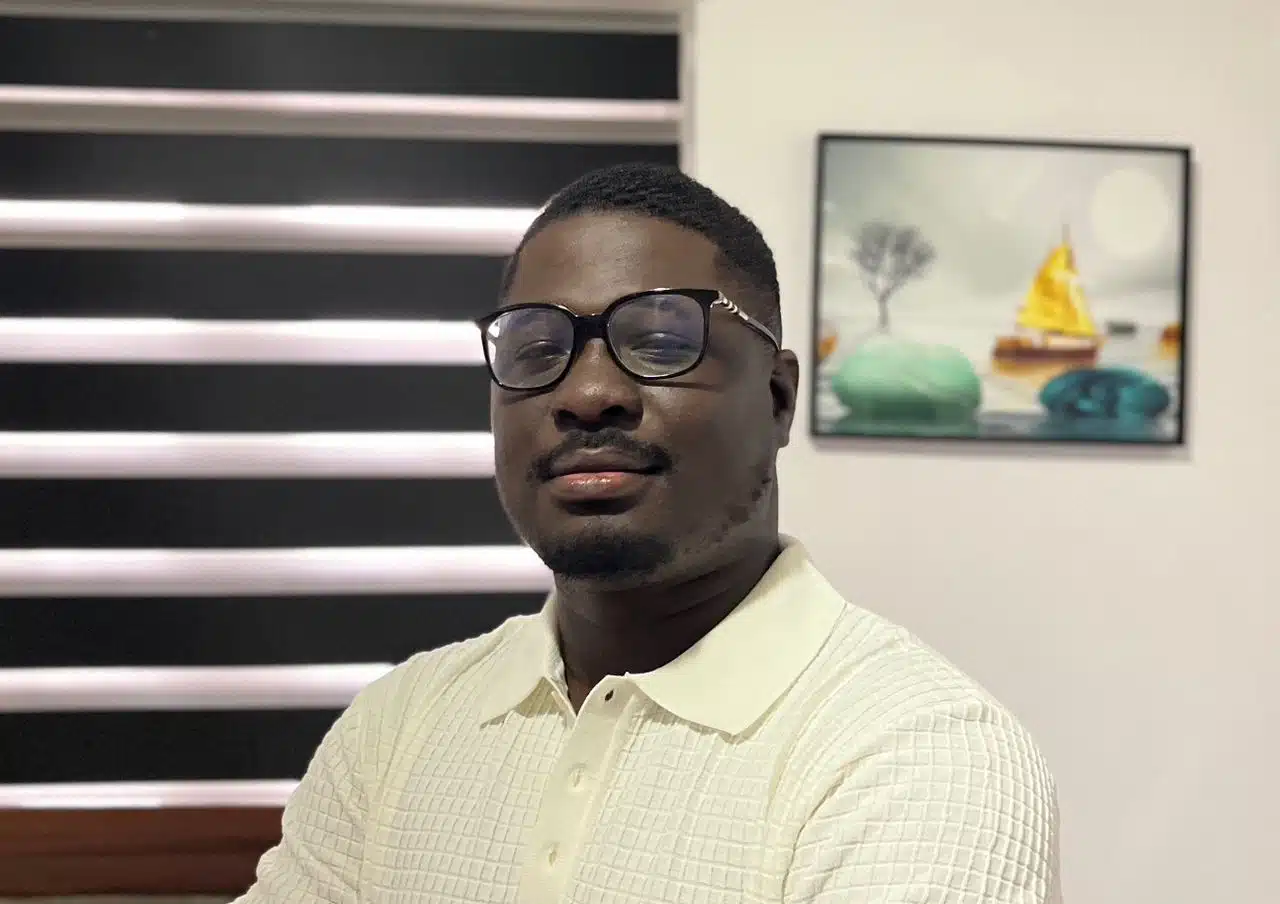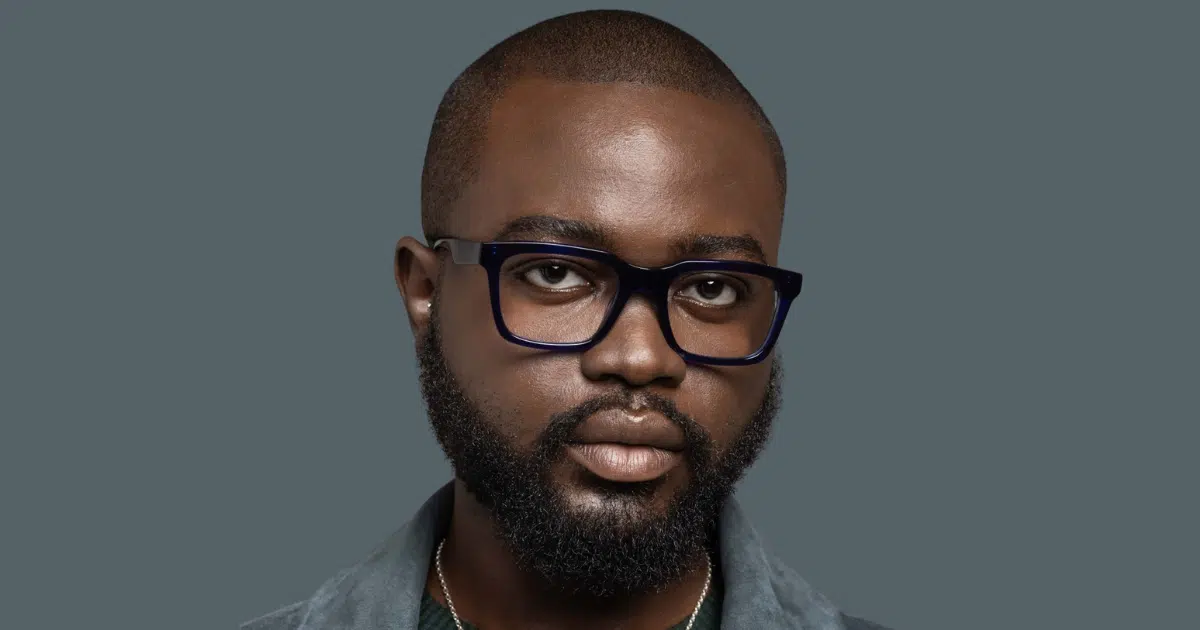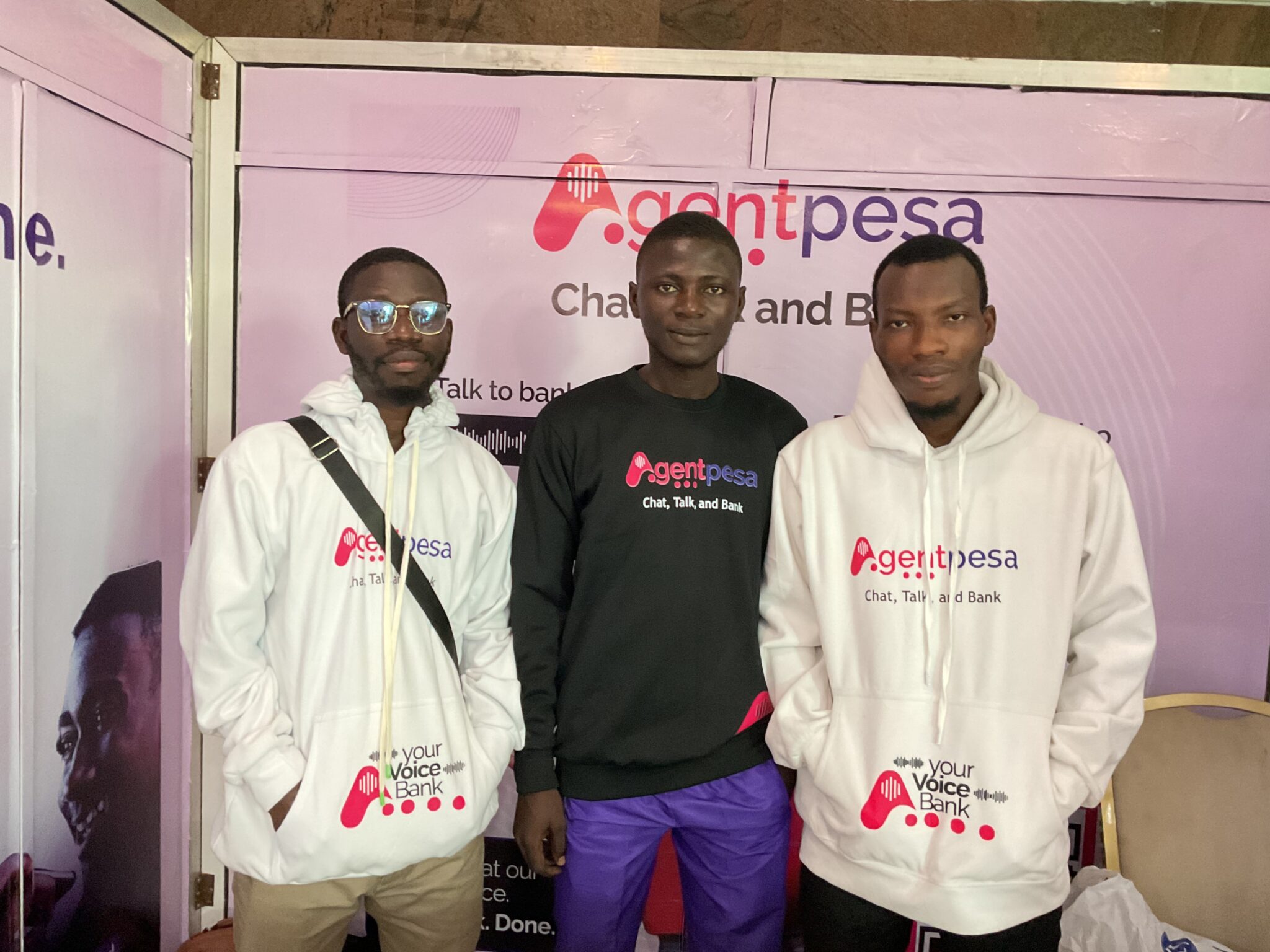It was a bright Friday afternoon in the administrative hub of Lagos State, Ikeja, Seun Adeola and I were set to meet for a chat at the Techpoint Africa studio. After a few minutes of setting up, I sat beside him – which in hindsight, wasn’t a great position. I realised post-production that I was so engrossed in the conversation that I forgot to take a look at the camera every now and then. Anyway, lesson learnt.
While we waited for the cue to begin, we sat up in our black swivel office chairs, which incidentally matched our t-shirts.

“Seun Adeola, two first names. My last name is also like a first name; Adeola,” Seun responded, acknowledging my compliment about two short names contrasting mine, which are 19 characters long. Moving on from the small talks, we kicked off the chat.
Seun has a reputation for growth and brand management, which, interestingly, can be easily described.
“When people say, ‘what have you done?’ I say, ‘do you know OPPO?’”
For context, before his current job, Seun was the public relations and digital marketing manager for OPPO, a Chinese smartphone manufacturing company, for three years. His achievements in this role, so far, are top of his list of accomplishments. He was responsible for establishing a brand presence for the company in Nigeria, which is still noticeable today.
He mentioned how he and his team worked tirelessly to create the appeal that OPPO smartphones have gained over the years in the Nigerian mobile phone market. And he achieved this through strategic partnerships with African and international football clubs and players, automobile manufacturers, famous reality shows, and celebrities.
“It’s very easy to point at. I particularly enjoyed that project; I worked with some very brilliant people on the project also,” he added, beaming with pride.

Currently, Seun is the growth operations lead for Nigeria at Shara, an African-focused fintech startup that offers a range of financial services for small business owners and salary earners. Though this is his first foray into the fintech industry, he’s able to capture his experience in three words: fun, new, and stressful.
With 12 years of experience in the bag, he has worked in banking, insurance, electronics, automobiles, mobile phones, and FMCGs industries, including destination marketing.
Because of this, he could make a comparison between marketing in a startup and a typical traditional agency company.
“Most marketing jobs are very brand focused. You find yourself discussing things like share of voice, impressions, conversions, and stuff like that.
“It’s very superficial. In tech companies, marketing and sales are one; they call them growth. So you need to make it work. Now you have a new concept, like unit economics. It means that it needs to make sense.
“Like if I’m spending $1, how many dollars did I make in revenue? How many dollars did I make in profit? Stuff like that would typically not happen in your regular brand. Number two is that there, you do QPR, Quarterly Performance Review; here, you do Weekly Performance Review.
“I kind of struggled with this in my first month. Your long-term goal is many short-term steps. But in traditional companies, you do a quarter-year review, half-year review, and a full-year review. The pace is slower. Also, if you make a mistake now, the business will feel it. So it’s very different from like a large corporation where you have to send to reporting line, global, regional office before it gets back to you.”
Despite this possible downside…
“You could get carried away because you’re so invested in work. It could affect your friendship or relationship.”
…Seun thinks marketing can be addictive. He explained how.
“For people who love marketing and sales, it’s like a drug. You just can’t have enough of it. So it keeps you thinking short-term. Your long-term goal is many short-term steps, right? That’s kind of how it is.
Driven by the famous fashion brand Nike trademark, ‘Just Do It!’ Seun is not afraid of taking risks.
“If I fail,” he shrugged, “if I don’t fail,” he paused for another shrug, “the only way to find out is if I do it.”
In the past 11 months at Shara, Seun said he had made significant transformations in the startup in Nigeria since it just came into the country.
“We’ve only scratched the surface, there’s a lot of potential for the business in Nigeria, and I’m happy to be spearheading that. And the interesting part is that we’re doing all these with zero marketing. It’s the first time I’m doing anything without a marketing budget. Everything is organic, we’re growth hacking, boots on the ground.”
If anything, Seun grew up as a vocal child and was always encouraged by his parents to speak up. He’s grateful as this has contributed mainly to his public speaking and communication skills, which are valuable to marketing.
I asked Seun what drives him; he leaned well into his seat, shook his head and said, “Trenches”. For context, ‘trenches’ is a popular Nigerian slang used to describe an underprivileged living condition. We both laughed at this revelation, but he made me understand that it’s an intense drive.
“Being in lack is something I fear so much, and it makes me very serious with my life. It makes me make better financial decisions.”
Marketing, growth, and everything in between

Seun told the story of how he began and how far he’s gone.
“When I was very young, I started out as a semi-professional cyclist. I always had dreams of being part of like the Tour de France, Tour de Dakar. I used to cycle a lot, I trained with the Nigerian Cycling Federation. But then, I think one of the coaches there told my parents to let me focus on school. Cycling is not something that will really become big in Nigeria. So it just fizzled out into being a hobby.
“Also, I always wanted to be an ambassador because there was a family friend who was an ambassador, he used to travel a lot. I just thought I wanted that life for myself. So I studied International Relations and Diplomacy.”
By the way, he had a funny story in secondary school.
“I was in boarding school. I created a political party with my friends, to revolt against eating a lot of beans. So we demanded spaghetti and corned beef, and we wanted more Jollof rice, but the school refused to give us. I was the dining hall prefect. So I’m like ‘nobody’s eating.’ So, we let the food spoil a couple of times before they now said, ‘students what do you people want?’ Then they eventually gave us what we wanted.”
Maybe you’re curious to know what happened to his cycling hobby.
“I still cycle sometimes, not a real bicycle. I used the elliptic cycle in the gym. But I don’t think it’s like before. I could cycle for hours before, but now after 15 minutes, I’m tired. Maybe it’s 30 plus.”
What about his ambassadorship dream? After all, he had his first and second degrees in international relations and Diplomacy.
“We will get there. We didn’t throw it away. There are three parts to that, you can be what we call a career diplomat, which means you will start from the Ministry of Foreign Affairs. You will line up, level seven, level eight, up till level 16.
“Then the second one is political appointment. You lose an election, and they compensate you with ambassadorship. And the third one is, you can join the core diplomatic by being a subject matter expert. When it comes to like marketing, I’ve done destination marketing, and that’s why I took that job.
“Because I’ve worked with governments like different African countries, even Europe. Now you can be an Abike Dabiri for your country, but with ambassadorial training. You can also be an Okonjo Iweala sort of. So there are different ways to it. The dream is still there, but for now, let’s do this.”

Interestingly, Seun has an entrepreneurship side, something he’d focus on if he wasn’t into sales. Spoiler alert, Seun might have a passion for marketing, but his love may just lie with the hospitality business.
“From school, we just used to organise parties. I think we went for a party one day, the party was very dead. We were like, ‘shey make we help them?‘ And we helped them. The party became lit. People asked, ‘who are these guys?’ So, they used to invite us to parties, if the party wants to die, we help them.
“They were like, why don’t you just start making money from this thing? Then we started organizing parties. We started doing collaborations with brands, partnered with brands, sponsorships, we started getting big. Then we registered the business and started running it like a proper company. It’s called The Party Company.”
Here are his thoughts on transitioning into marketing. Heads up, Seun had to learn the hard way.
“First thing that happened was that my parents stopped any form of support. It just stopped, no heads up, nothing! Anyway, I had saved some money and I was managing that, and then the money finished. I remember I used to play football manager at home. I’ll just be on the bed. I’ll play overnight, and then I’ll sleep during the day. But I realised that I need to eat because I was forbidden from eating in the house. I was idle. They said, ‘okay, maybe because you’re still eating, that’s why you’re idle.’
“So I started thinking of what to do to make money. I’ll go to Nairaland, I’ll read stuff. And I read somewhere that you can sell cars to make money. So I went to some car dealers around Barracks and Stadium in Surulere. And then I told them I’m there to sell cars.
“They laughed at me. Then they said if I can sell a car, they’ll give me like ₦50,000. That year, it was quite a lot. So I took pictures of the vehicles. The first car I sold, sold for ₦350,000. The owner of the car sold the car for ₦300,000, and he also gave me ₦20,000; then I just realised that I can do something for yourself, ‘you don’t have to rely on people.’
“It felt so good. That ₦70,000 was the sweetest thing that happened to me. So I wanted that to continue. I kept doing that and realised that it seemed like I knew how to convince people. While doing that, I’ll go and teach and then do personal shopping for my friends.
“My first job. I learnt of a company and I went there, they said, they’re not employing. So I said, ‘I want to work here for free.’ It was an advertising company. So I started, I resumed the first day and I was doing everything. I didn’t mind. I was learning. I would sit down in their meetings and just listen. So whenever they give somebody something to do, I’ll do it on my own, then I’ll come and show my boss, so he’ll correct me.
“One day, we were in one meeting and they were brainstorming ideas for copywriting and the ideas were really poor. I just said something, and they said it made sense. They used it, and the client liked it, That was how they gave me a job, actually. Then I saw a job ad on Twitter, I applied, went for the interview and got the job. That Job was in a marketing company. At that time, digital marketing wasn’t a thing.
“I read this book by Malcolm Gladwell, called Outliersm, that says that if you do 10,000 hours of anything, you’ve attained master. I did my 10,000 hours. It was supposed to take me like four years. I think I did it in two and a half or so. I wanted to become a master. I worked there for four years, then I left when I was tired of agency life.
“I put myself out there on social media. Twitter, for instance, I know we’re there on the platform to laugh and play, but the person you are laughing with is good at something. Right? One of the things I do is to network in all directions; upward, downwards, sideways. I won’t say because this person is an intern, I don’t want to talk to them. No. People try to network upward only. I do a mix of it. At least if I need something, I know someone; if I don’t know someone, I can ask you and then you help me find someone.
“So I talk to somebody who’s in that [new] field. What’s this field like? What matters most? How do you measure success here? I also do a lot of research. I stalk competitors a lot. I want to see what they’re doing. I want to know what they’re up to. I want to understand them.
“YouTube is your friend, whatever you’re looking for, someone has made a video about it. Don’t be shy to ask questions. I’m not afraid to be ignorant. I know I’m a subject matter expert, but I’m not a field expert, so I need your help to apply what I know here. Your new colleagues are less defensive when they feel like you’re vulnerable towards them.”
Let’s see how an average day goes for him.
“I like to start from the night before. I plan my day before I go to bed. Then I start the day with a stand-up session with my team. You always have to be in sync. I do quite some ops work until like 12 noon. After 12 noon, I get into my actual work. I try to stop working by six, deliberately. Even if I have some extra work to do, I always stop working by six. I go to the gym or watch Netflix.
“Maybe later by 9, 10, If I have extra work, I just do some work, till like 12, it depends. But I always try to have a start and stop time for work.”
And this is what leading operations at Shara look like for Seun.
“It varies. I work with data sometimes. Other times I’m out on the field. I go to the field a lot. When I say field, I’m talking about the markets, because we [Shara] do SME financing. We have customers in Oke Arin, Idumota, Ebute Ero, Alaba, and Ladipo. I go to those places, I will have to wear my company uniform.
“When I go there, it’s a different orientation. I’m not speaking English. I’m speaking Yoruba, pidgin, and a bit of Igbo. But you don’t want to go to the field before doing ops work. I’m not doing my growth from the office every day. In the trenches, that’s where my customers are. I’m very close to my customers.
“When everybody’s talking about their brilliant ideas, I’m telling them the mind of the customer. ‘I know you want to do this, but here’s what the customer really needs. So, even though that’s nice, let’s prioritise this.’
“While I’m driving between places, I’m on calls speaking to my team. I’m speaking to my supervisors in different regions. It’s a very fluid structure. I won’t say it’s very regimented. The only thing I have that is regimented are meetings. That’s already scheduled.”
You should pay attention here if you’re going into marketing
“Well, I think specialisations first. For marketing, you have above-the-line, below-the-line, and through-the-line. Above-the-line is out of home, radio, TV; below-the-line is activation, experiential and all of that; through-the-line is your digital PR.
“Pick a specialisation. Pause there for a while, maybe four years. Become that good. While you’re doing that, you’re picking what we call passive knowledge in the other aspects. You don’t need to be great at everything, You need to be strong as one thing and have a good working knowledge of others. Then, when you now take that to tech you can apply that.
“So if you want to start your career in marketing, I won’t encourage you to start in tech. You’ll be quite restricted. I would encourage you to go to an agency. If you have the right attitude, you’ll learn, and you try your hands at different things. You’ll also be under the tutelage of people who are a lot more experienced. Your actions have little impact on the outcome. So you can make mistakes there.
“If you make mistake in a startup that’s bootstrapped, everything goes down, you know? And it’s also good for your confidence. You need to be quite good with different types of sheets, you need data appreciation skills. you also need teamwork and collaborative skills, you need to develop that and also be very detailed.
“You need to be able to articulate your points. Sometimes you’re upset, you should also have emotional balance, so you will be a buffer a lot. Because marketing and sales are in the firing line, you need to have a tough core and spine.”
I asked him, who would you advise not to go into marketing? And he answered frankly.
Someone that is too lazy to develop themselves, to ask questions, to research. Anybody who is mentally lazy shouldn’t bother. Right? There’s a drive you need to have and that passion is very important. That’s all! Anybody can do it.
Seun relaxes from work by watching movies and clubbing. On his bucket list is a plan to drive through three European countries on high-speed motorways and document the process. Apparently, he has it all planned out, but it’s pretty expensive.



